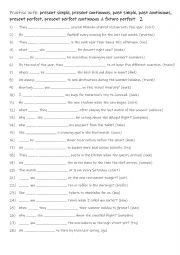
|
A2+-B1 Practise with present simple, present continuous, past simple, past continuous, present perfect, present perfect continuous & future perfect 2
Learning key tenses such as the present simple, present continuous, past simple, past continuous, present perfect simple, and present perfect continuous enables students to communicate clearly by expressing actions and events with accuracy. These tenses cover a wide range of contexts, from daily routines and ongoing activities to completed actions ...
Level: elementary
Age: 8-100
Type:
Downloads: 144
|
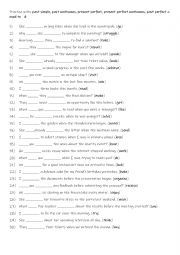
|
A2+-B1 Practise with past simple, past continuous, present perfect, present perfect continuous, past perfect & used to 4
Practising these tenses helps students express different aspects of time and actions effectively. The past simple is vital for describing completed actions, while the past continuous sets scenes or shows interruptions in the past. The present perfect connects past actions to the present, and the present perfect continuous highlights ongoing or repe...
Level: elementary
Age: 8-100
Type:
Downloads: 159
|
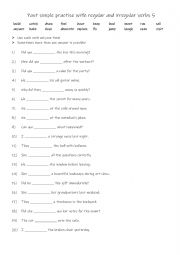
|
Past simple practise with regular and irregular verbs 5
Students first familiarise themselves with the 20 verbs. Then they complete the gap-fill with the correct form of that verb. Answers on page 2.
Level: elementary
Age: 7-100
Type:
Downloads: 140
|
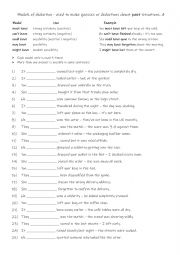
|
Modals of deduction - used to make guesses or deductions about past situations. 4
Students should learn modals of deduction because they are useful for expressing logical guesses or assumptions about past situations, helping speakers show how certain or uncertain they are. These modals, such as must have, might have, could have, and can�t have, make speech sound more natural and fluent, improve communication and reasoning skills...
Level: elementary
Age: 8-100
Type:
Downloads: 150
|
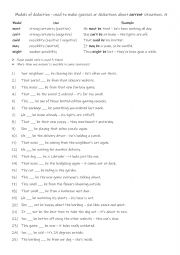
|
Modals of deduction - used to make guesses or deductions about current situations. 4
Students should learn modals of deduction because they are useful for expressing logical guesses or assumptions about present situations, helping speakers show how certain or uncertain they are. These modals, such as must, might, could, and can�t, make speech sound more natural and fluent, improve communication and reasoning skills, and are commonl...
Level: elementary
Age: 8-100
Type:
Downloads: 143
|
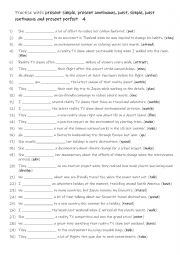
|
A2-B1 Practise with present simple, present continuous, past, simple, past continuous and present perfect 4
Students at A2-B1 level should practise the present simple, present continuous, past simple, past continuous, and present perfect tenses as they form the foundation of clear and effective communication. These tenses enable learners to discuss routines, habits, and facts, describe ongoing actions, recount past events, and share experiences or achiev...
Level: elementary
Age: 8-100
Type:
Downloads: 131
|
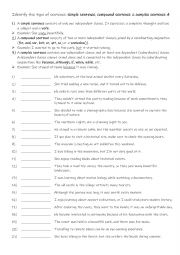
|
A2 Identify the type of sentence simple sentence, compound sentence & complex sentence 4
Students should learn to identify simple, compound, and complex sentences because it helps them write with more variety, organise ideas clearly, understand reading texts more easily, prepare for future learning, and communicate their thoughts more accurately. Each type is used 7 times. Answers on page 2.
Level: elementary
Age: 9-100
Type:
Downloads: 169
|
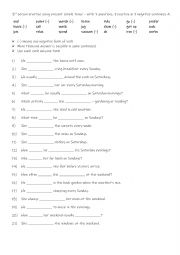
|
3rd person practise using present simple tense � with positive & negative sentences + questions 4
Students familiarise themselves with the 21 verbs. Then they read the sentences to see which question verb is required to complete the gap-fill. Each form is used 7 times! Answers on page 2.
Level: elementary
Age: 7-100
Type:
Downloads: 135
|
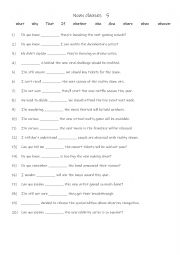
|
10 Noun clauses 5
Students complete the gap-fill with the correct word. Each word is used 2 times! Answers on page 2.
Level: elementary
Age: 10-100
Type:
Downloads: 132
|

|
Expressions of preference, desire, or regret I�d rather, I wish, if only & it�s time 3
Students should learn expressions of preference, desire, or regret like "I�d rather," "I wish," "If only," and "It�s time" because they help them communicate personal feelings, make choices, and reflect on past experiences or future possibilities in English. These phrases allow students to express what they want, what they regret, or what they feel...
Level: elementary
Age: 9-100
Type:
Downloads: 142
|
|
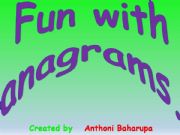
Fun with Anagrams
Students in pairs / groups read the sentence on each of the 20 slides, trying to find out the wrong word. Then rearrange the wrong word to make a more logical sentence. An example is shown on the 2nd slide. Good for a warmer or cooler too. Part 1 of 2
Level: intermediate
Age: 12-100
Downloads: 4137
|
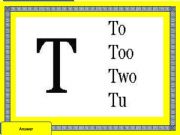
Catchphrase- Rebus -Dingbats
A fun way to remember vocabulary with this animated rebus containing compounds, common phrases, phrasal verbs and nouns. Part 8 of 8
Level: intermediate
Age: 12-100
Downloads: 1752
|
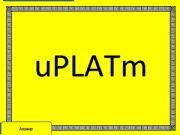
Catchphrase-Rebus-Dingbats
An excellent way to remember vocabulary with this animated rebus containing compounds, common phrases, phrasal verbs and nouns. Part 7 of 8
Level: intermediate
Age: 12-100
Downloads: 1932
|
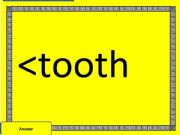
Catchphrase - Rebus - Dingbats
A fun way to remember vocabulary with this rebus containing compounds, common phrases, phrasal verbs and nouns. Part 6-8
Level: intermediate
Age: 12-100
Downloads: 1823
|
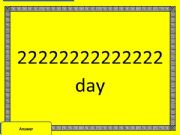
Catchphrase-Rebus -Dingbats
An excellent way to remember vocabulary with this rebus containing compounds, common phrases, phrasal verbs and nouns. Part 5 of 8
Level: intermediate
Age: 12-100
Downloads: 1917
|
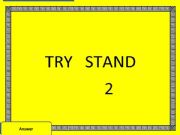
Catchphrase- Dingbats -Rebus
A fun way to remember vocabulary with this rebus containing compounds, common phrases, phrasal verbs and nouns. Part 4 of 8
Level: intermediate
Age: 12-100
Downloads: 1949
|
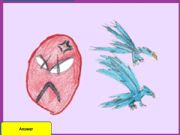
Catchphrase-Rebus-Dingbats
An excellent way to remember vocabulary with this rebus containing compounds, common phrases, phrasal verbs and nouns. Part 3 of 8
Level: elementary
Age: 7-6
Downloads: 2073
|
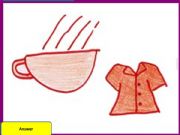
Catchphrase-Rebus-Dingbats
A fun way to remember vocabulary with this rebus containing compounds, common phrases, phrasal verbs and nouns. Part 2 of 8
Level: elementary
Age: 7-16
Downloads: 2008
|
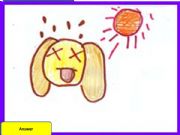
Catchphrase-Rebus-Dingbats
An excellent way to remember vocabulary with this rebus containing compounds, common phrases, phrasal verbs and nouns. Part 1 of 8
Level: elementary
Age: 7-16
Downloads: 2038
|
|
|





















